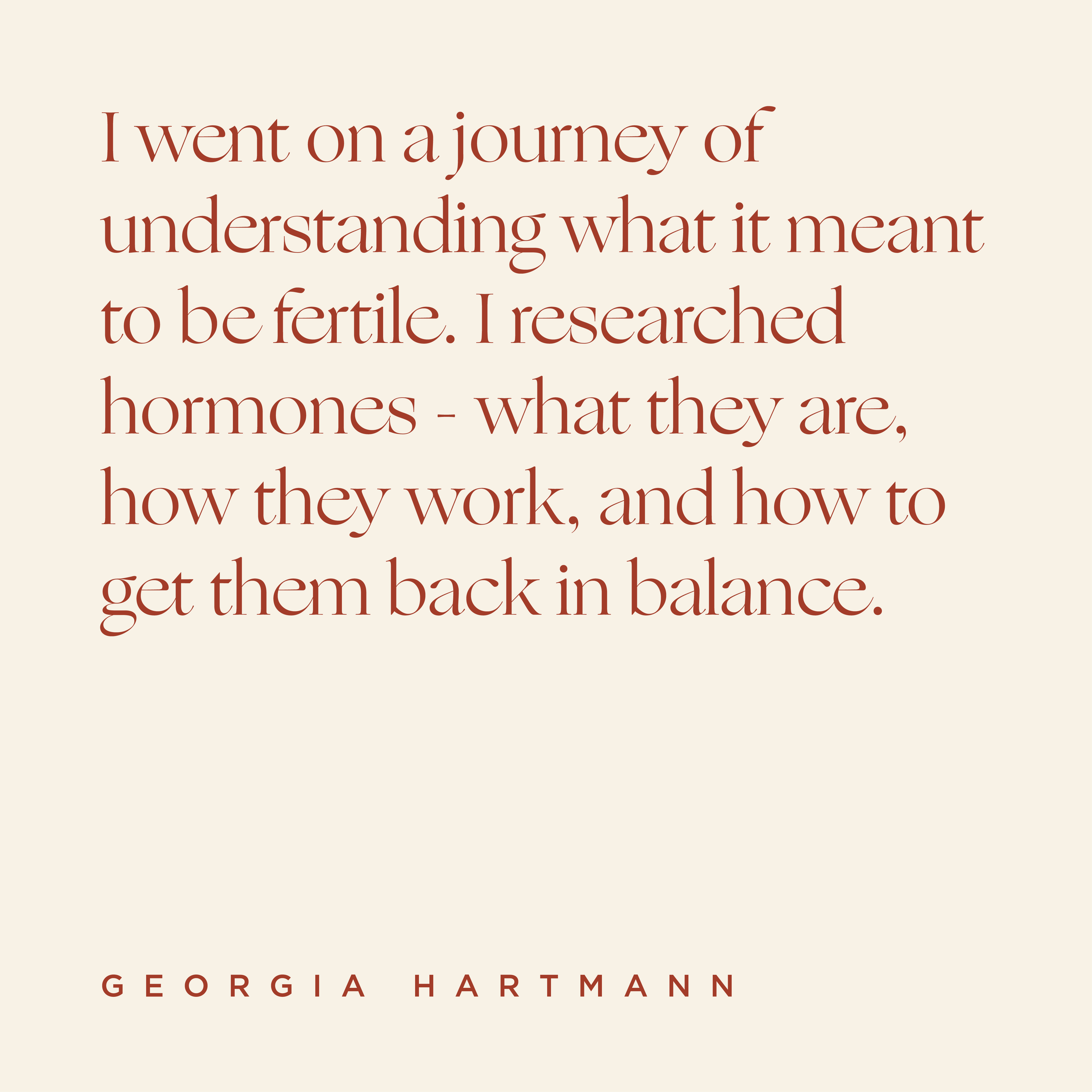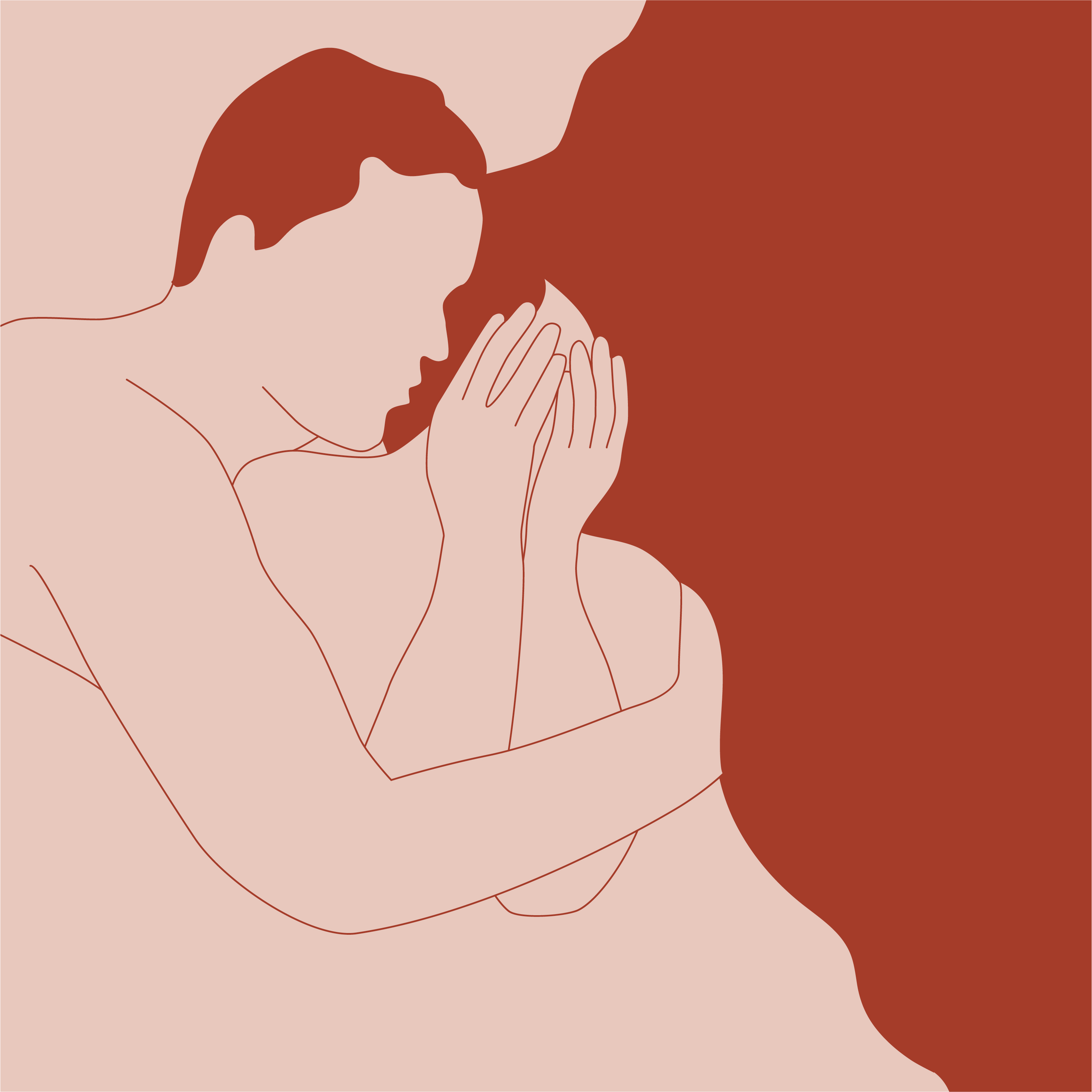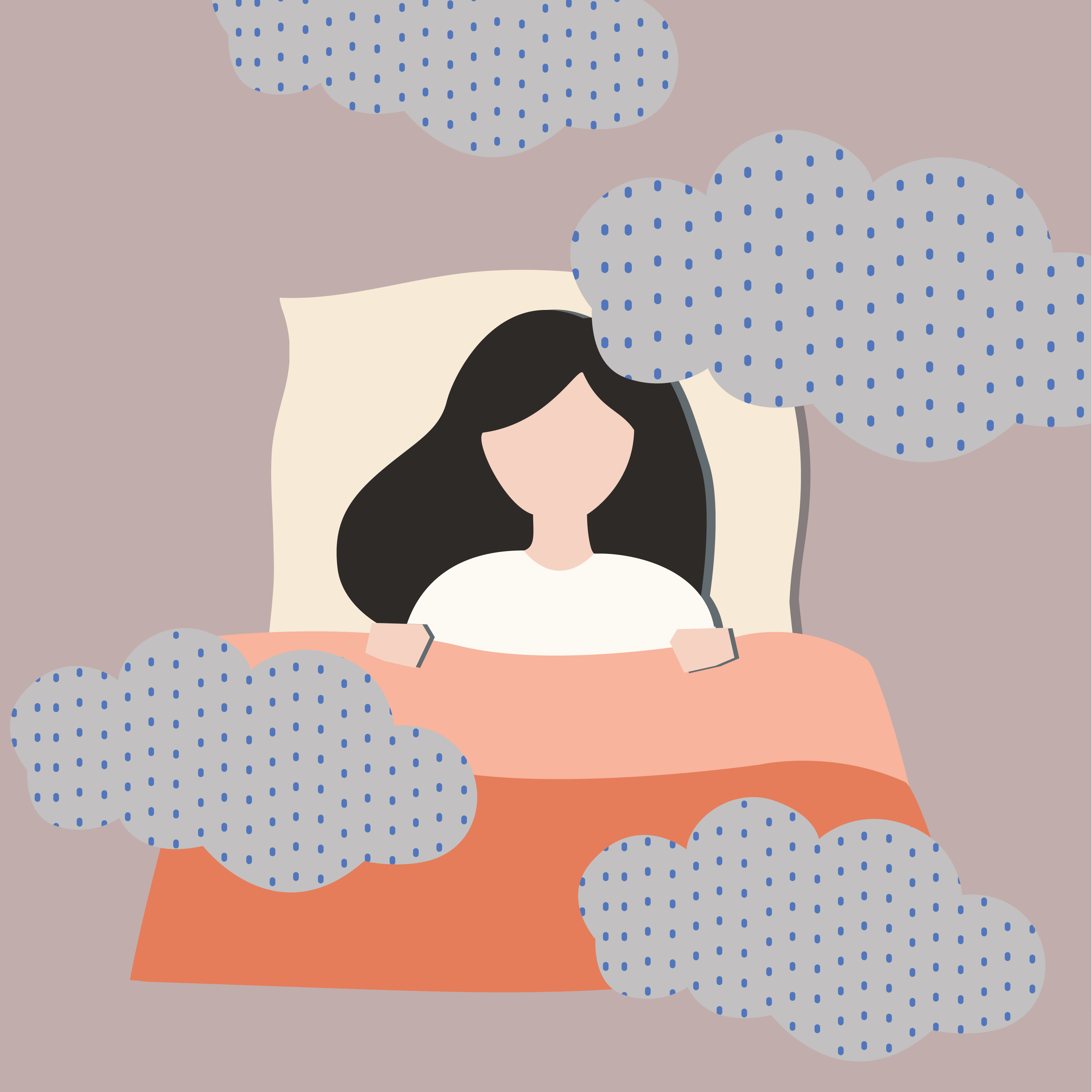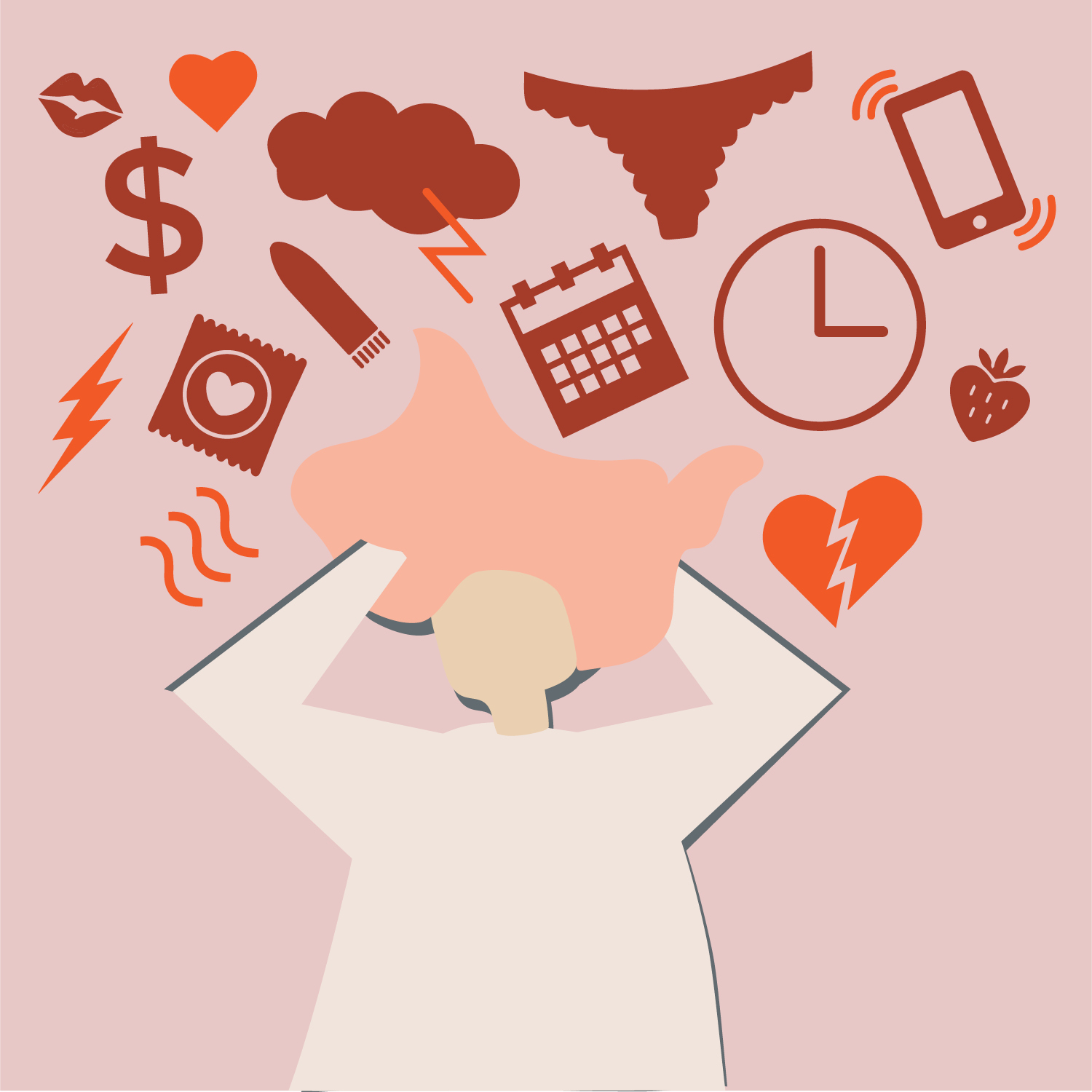Jun 07, 2022
STRESSED? NOT SLEEPING? TRYING TO CONCEIVE?
By Georgia Hartmann
I remember—clear as day—my life as a graduate. I’d just spent five years at college. I was excited; eager; passionate; ready to say goodbye to government support and finally make a wage. I was up before the sun—I’d do a HIIT class, have a double espresso, and dive into yet another professional development course–all before heading to my 9-6 with Zig Ziglar playing in the background. The rest of the day would follow a very similar fast pace.
Fast-forward a couple of years and it hit me. A whirlpool of anxiety. I wasn’t sleeping. I’d rely on a glass of red to wind down each night. I’d wake in the morning with palpitations. I was gaining weight. And I was diagnosed with premature ovarian failure (early menopause). I was only 24.
And so, something had to shift.
I went on a journey of understanding what it meant to be fertile. I researched hormones—what they are, how they work, and how to get them back in balance. I did a complete overhaul of my lifestyle and, long story short, I ended up conceiving my firstborn naturally. And at the time of writing this article, Otto is almost two and I’m about to birth my second child. Again, a natural, uncomplicated conception.
Now it’s not to say that all fertility journeys mirror that of my own. I know this because at Hormone Health Studio we see fertility journeys of all types. However, what I do know is that irrespective of a diagnosis, there is so much in our control.
Focus on what you can control
Sure, a diagnosis of early menopause left me shattered. But rather than focusing on a label (which I cannot control), I focused on all of the things I can control. You see, we can control the food we eat, the movement we do, the people we spend time with, the supplements we take, the chemicals we use in our homes and on our bodies.
We can also control our stress and our sleep.

The influence of stress on fertility
A recent article published in the Journal of International Medical Research found that constant exposure to stress affects specific endocrine glands–the hypothalamus, pituitary and the adrenal glands–which triggers a cascade of events ultimately resulting in inflammation and difficulty conceiving. [1]
In women, constant exposure to high stress affects ovulation, cycle length, fertilisation and the ability of the embryo to implant. [2] Interestingly, one study reported that women who received some form of psychological support on their fertility journey were approximately twice as likely to become pregnant. [3]
And what about men? Well, they’re no different. Constant high levels of stress directly affects the communication between the hypothalamus and the testes, ultimately altering testosterone levels and affecting specific sperm cells called Leydig and Serotli cells which are required to actually make sperm. [4]
So, stop stressing
Easier said than done, right. Rather than completely eradicating any stress, what we actually need to do is get a balance between healthy stress and toxic stress. See, moments of stress throughout the day are actually beneficial. It can be a similar feeling to excitement and actually keep us on our toes. It’s the long-term, relentless stress that leaves us head-in-hands that we need to get on top of. And really the only way to get on top of this type of stress is to ask yourself the hard question–what needs to change?
Is it time to take a side-step in your career? Is it time to say goodbye to a relationship? Do you need to start saying no?
The influence of sleep on fertility
Despite the fact that one third of our lives is dedicated to sleep, around 30% of adults complain of poor sleep. Although being tired throughout the day may seem insignificant, the problem with poor sleep is that it increases the risk of obesity, diabetes, depression, cardiovascular disease, as well as difficulty conceiving. [5]
A systematic review published last year found that those who slept less than 6 hours per night, had poor quality sleep, or who worked night shifts had increased chance of experiencing irregular menstrual cycles, low libido, altered sperm parameters (including reduced sperm count and motility), and difficulty conceiving both naturally and through IVF. [5]
Sleep your way to pregnancy
The problem many of us face is that we prioritise all other activities in our day–work, deadlines, chores–and leave sleep to whatever little time remains. When it comes to fertility, the research is clear that this ratio needs to flip. Those who sleep 7-8 hours per night have shown to have higher pregnancy rates compared to those who get either less than 6 hours or more than 9 hours. [5]
So, here’s a few tips to get you sleeping better.
- Go to bed at the same time each night and wake at the same time each morning–This helps to regulate your body’s circadian rhythm and sleep pattern. [6]
- Exercise daily, preferably in the morning–Regular exercise helps to improve all aspects of sleep including how long it takes you to fall asleep, total duration, as well as the number of wakings during the night. Sticking to an exercise routine for at least 12 weeks has been shown to have the most profound impact on sleep quality. [7-8]
- Limit caffeine to 1 cup of coffee before 10 am–Caffeine has a varying half-life of up to 10 hours. This means that after a single cup of coffee, the amount of caffeine in your system after 10 hours would only have decreased by 50%. It then takes potentially another 10 hours for the remainder of caffeine to be completely eliminated. If you are having two, three, four, or more cups of coffee per day, this is where sleep becomes impacted. [9]
- Cut the alcohol–Although many people use alcohol as a sleep-aid, it actually disturbs the quality of sleep in the second half of the night. Specifically, alcohol acts on wake-promoting neurons in the brain that ultimately do not allow you to stay in deep sleep and leave you feeling fatigued the following morning (not to mention the effect of alcohol on fertility). [10]
- Ensure your bedroom is conducive to good quality sleep–The bedroom is for sleeping (and baby-making) only; not for working or watching TV. Exposure to artificial light before bed, whether that’s from your phone, laptop, TV, or room lights, decreases melatonin production. As melatonin is our sleep hormone, reduced levels will result in difficulty getting to and staying asleep.[11]
- Phone down by 8 pm–For the above reason, it is important that you put all your devices down in the evening and enter your ‘calm space’. Enjoying a cup of chamomile tea; run a bath; meditate or lay with your legs up the wall for 10 minutes; read a book.Seek additional support–If you have implemented all of the above and are still finding it difficult to get good quality sleep, seek the support of a naturopath who can provide you with personalised nutritional and herbal supplementation. These have an amazingly nourishing and restorative effect on the body, which ultimately supports good quality sleep (and optimises fertility). [12-14]
References:
[1] Szkodziak, F., et al. Psychological aspects of infertility. A systematic review. Journal of International Medical Research, 2020. 48(6). PMID: 32600086.
[2] Palomba, S., et al. Lifestyle and fertility: the influence of stress and quality of life on female fertility. Reproductive Biology & Endocrinology, 2018. PMID: 30501641.
[3] Frederiksen, Y., et al. Efficacy of psychosocial interventions for psychological and pregnancy outcomes in infertile women and men: a systematic review and meta-analysis. BMJ Open, 2015. 5(1). PMID: 25631310.
[4] Nargund, V.H. Effects of psychological stress on male fertility. Nature Reviews: Urology, 2015. 12(7). PMID: 26057063.
[5] Caetano, G., et al. Impact of sleep on female and male reproductive functions: a systematic review. Fertility & Sterility, 2021. 115(3). PMID: 33054981.
[6] Reddy, S., et al. Physiology: Circadian Rhythm. StatPearls, 2020. PMID: 30137792.
[7] Banno, M., et al. Exercise can improve sleep quality: a systematic review and meta-analysis. Peer-Reviewed & Open Access, 2018. PMID: 30018855.
[8] Rubio-Arias, J.A., et al. Effect of exercise on sleep quality and insomnia in middle-aged women: A systematic review and meta-analysis of randomized controlled trials. Maturitas, 2017. PMID: 28539176.
[9] O’Callaghan, F., et al. Effects of caffeine on sleep quality and daytime functioning. Risk Management and Healthcare Policy, 2018. PMID: 30573997.
[10] Thakkar, M.M., et al. Alcohol disrupts sleep homeostasis. Alcohol, 2015. 49(4). PMID: 25499829.
[11] Gooley, J.J., et al. Exposure to Room Light before Bedtime Suppresses Melatonin Onset and Shortens Melatonin Duration in Humans. Journal of Clinical Endocrinology & Metabolism, 2011. 96(3). PMID: 21193540.
[12] Maroo, N., et al. Efficacy and safety of a polyherbal sedative-hypnotic formulation NSF-3 in primary insomnia in comparison to zolpidem: a randomized controlled trial. Indian Journal of Pharmacology, 2013. 45(1). PMID: 23543804.
[13] Lakhan, S.E., et al. Nutritional and herbal supplements for anxiety and anxiety-related disorders: A systematic review. Nutrition Journal, 2010. 9. PMID: 20929532.
[14] Cao, Y., et al. Magnesium Intake and Sleep Disorder Symptoms: Findings from the Jiangsu Nutrition Study of Chinese Adults at Five-Year Follow-Up. Nutrients, 2018. 10(10). PMID: 30248967.
Blogs

Jun 08, 2022
EXPLORING PERIOD CARE IN CULTURES AROUND THE WORLD
Our TOM Talks panelist Sabina McKenna explores how different cultures around the world approach period care.
Read More
Jun 08, 2022
STOP APOLOGISING FOR HAVING YOUR PERIOD
Our TOM Talks panelist Mel Mason talks about the importance of not apologising for having your period.
Read More
Jun 07, 2022
STRESSED? NOT SLEEPING? TRYING TO CONCEIVE?
TOM Talk's panelist Georgia Hartmann discussed the links between stress, sleep and fertility.
Read More
Jun 07, 2022
STRESS AND HOW IT AFFECTS YOUR SEX DRIVE
Certified sex coach Georgia Grace is here to unpack the link between stress and sex.
Read More
